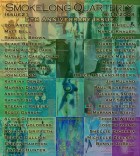You served as the guest editor for issue five of SmokeLong. As an editor, what were you looking for in submissions? Why did you chose “Like Swimming” as your featured story? Are there qualities and elements in it that would catch your editorial eye?
I want to be moved by stories—that’s probably the main thing. Not in a sappy sort of way, but I like stories that feel lived-in and dinged-up. Also, funny. I’m not a huge fun of metafiction or verbal gymnastics, but if a story is funny I’ll lower my barriers.
I picked “Like Swimming” because I like that moment in it—not when they see couple in the car, but that moment right before then, a moment of temporary connection. I do that all the time, maybe too often, in stories, even really short ones, but those moments are huge, right? I mean, don’t most of us feel this way? I hope so. Actually, it was a toss-up between this story and “Castanets” a story from FRiGG—and I like (and don’t like) the same things from each story. I never fully like a story after it’s written, and I suspect this is true for most of us.
I assume you started your fiction-writing career as writer of longer stories. When did you begin writing flash? What attracted you to writing flash?
I started with short stories, and now I’m going back to short stories because that’s my favorite form. I’m a terrible novelist, seriously, I wrote three novels, and I don’t even know where two of them are anymore. Some people just aren’t suited for marathons, especially if they are doughy people.
I wrote flash because I wasn’t getting anywhere with novels. So, I joined the Zoetrope writing studio, and started writing these short-short stories, and they’re fun to write, and you can get them done more quickly (sometimes) but there’s also something limiting about them. Also, it’s harder to get back into the rhythm of short stories after a couple of years of mostly writing flash, but it can be done if you’re an incredibly hard worker like me (kidding, a sad joke).
What can you, as a fiction writer, do with flash that you can’t do with longer stories? What can you NOT do with flash that you can do with longer stories? (I’m not talking about other writers here; I’m talking about YOU.)
I love the same thing about flash that I love about Edward Hopper’s paintings. They capture one moment, and when they’re done well, they have that haunting/haunted feel. I think (and I’m surely not original here) that writing is mostly about loneliness and loss, but, again, that doesn’t mean that they need to be somber—in fact, it’s probably a great reason to go in the other direction.
Longer stories let you into more lives, and more life. The power is in the accumulation of story and details, and I don’t think flash does that as well, even the very best short-short fiction.
What is the best flash you have ever read? If that one’s too hard, here’s another one: What is the best flash you have ready lately? Why do you like this one?
Oh, this is not my favorite question, at all. I’m going to name three, but that means I’m leaving out fifty.
My favorite flash ever is Mary Robison’s “Yours.” I just think it’s extraordinary, and I love this line: “He wanted to tell her, from the greater perspective he had, that to own only a little talent, like his, was an awful, plaguing thing; that being only a little special meant you expected too much, most of the time, and liked yourself too little.”
I could spend fifty hours naming 500 incredible flash stories, but I won’t because even if I tried, I’d forget someone. But, OK, I’ll name two: “Cherry” by Claudia Smith and “What Kind of Person Gives Secrets to the Sky” by Kathy Fish. Both of these stories contain everything I want from fiction; they are beautiful and unsettling, all at once. And both of them are in my favorite book of flash fiction, ever, “A Peculiar Feeling of Restlessness.”
The question we’ve been asking many contributors to our fifth anniversary issue seems particularly appropriate for you, as there’s so much nostalgia and longing in your stories. So… what are some of the changes you’ve seen over the last five years in the biz? How do you handle the ups and downs, the shifts in philosophy, etc.?
I don’t know if I’ve seen any major changes, but, there are more anthologies now publishing flash fiction, and more contests, and more space in literary magazines. So, that’s all promising. There are all these fine literary magazines online—I’ve mentioned a few, but anyone can go to newpages.com to find a whole lot more—and there’s a perfect, and tiny (paper) magazine called Quick Fiction that I can’t recommend enough.
These days the news seems sort of dire for literary fiction writers, no matter what type of fiction we indulge in, and as you surely know, there are always a million solid reasons to stop writing and just live a normal human life, but it’s too late, we have this disease, this addiction, these lives inside us that need to get out.
And it’s never, never enough.



 The SmokeLong Grand Micro Contest (The Mikey) is now an annual competition celebrating and compensating the best micro fiction and nonfiction online.
The SmokeLong Grand Micro Contest (The Mikey) is now an annual competition celebrating and compensating the best micro fiction and nonfiction online.